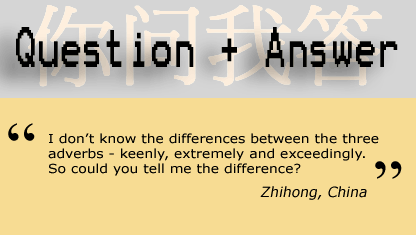|

|
Listen to this programme first and then read the content below. 请先听节目然后再阅读以下内容。
Programme Summary 节目梗概
Zhihong asks about extremely, exceedingly and keenly. These three words are all fairly formal and we are more likely to read these words than hear people say them.
The word extremely means very. But it is slightly stronger than very so while we can say that parts of China are very hot in the summer, we can say that Ethiopia is extremely hot.
|

|
|
| Angkor Wat, Cambodia |
Exceedingly has the same meaning as extremely but it is more formal and is used much less. The example that we hear in this week’s programme describes Cambodia’s Angkor Wat temples as “exceedingly well-preserved”.
The third word that Zhihong asks about is keenly. This word has a similar meaning to the other two but is rarely used. When it does appear, it is usually with these same adjectives and verbs:
To be keenly interested
To keenly follow
To keenly feel
To be keenly aware
Listen to the programme to hear some real examples of these words in use from BBC programmes. You will also hear some tips from William about how to learn the differences between very similar words like extremely, exceedingly and keenly.
If you have a question please email us at questions.chinaelt@bbc.co.uk. We'll answer one question every week and you never know – it might be yours!
Glossary 词汇
Ethiopia
埃塞俄比亚
formal
正式的
well-preserved
保护完善的
adjectives
形容词
verbs
动词
tips
技巧





